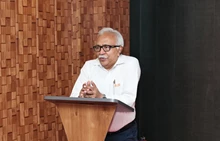
Dr. Mansukh Mandaviya, Union Minister of Chemicals and Fertilizers and Minister of Health & Family Welfare, Government of India, unveiled the National Policy on Research and Development and Innovation in Pharma-MedTech Sector in India along with the Scheme for the Promotion of Research and Innovation in Pharma MedTech Sector (PRIP) today.
At the launch event, which saw the presence of many dignitaries including Dr. V. K. Paul, Member of NITI Aayog, S. Aparna, Secretary (Pharma) in the Ministry of Chemicals and Fertilizers, and Dr. Rajiv Bahl, Director General of ICMR, Dr. Mandaviya emphasized the transformative potential of these initiatives.
Dr. Mandaviya stated that the objective of these initiatives is to transition the Indian Pharma and MedTech sectors from their current cost-driven orientation to becoming value-driven and innovation-centric. He further mentioned that this day is historic and represents a significant turning point in the journey towards achieving 'Atmanirbharta' (self-reliance) in these crucial sectors.
The scheme, according to Dr. Mandaviya, aims to position India as a high-volume, high-value player in the global pharmaceutical market. It emphasizes the crucial elements of quality, accessibility, and affordability, ensuring that India becomes a hub for pharmaceutical exports.
Furthermore, Dr. Mandaviya highlighted the importance of creating an ecosystem that nurtures skills and capacities, involving academia and the private sector. This approach will not only foster innovation but also encourage youth entrepreneurship through start-ups.
Dr. Mandaviya reiterated the Indian government's commitment to growth and innovation, emphasizing the significance of the healthcare and pharmaceutical sector. He highlighted the need for mass production of pharmaceutical products and medical devices and announced the establishment of three bulk drug parks in Himachal Pradesh, Vizag, and Gujarat, along with four medical device parks in Himachal Pradesh, Uttar Pradesh, Madhya Pradesh, and Tamil Nadu, to strengthen the sector further.
The Union Minister emphasized that self-reliance in pharmaceuticals and medical devices could only be achieved by strengthening the research and development infrastructure. He pointed out that India must create policies and products that align with both national and global needs, in consultation with industry and academia. He suggested that the goal should be to attain such independence that the country is not reliant on anyone for its critical healthcare needs.
Dr. V. K. Paul, Member (Health) of NITI Aayog, highlighted that India is now leading the world by learning from past experiences. He underscored the importance of collaboration between academia, public institutions, and private entities, citing the scheme's role in preparing India to tackle future challenges and ensure national biosecurity.
The event witnessed the participation of senior officials from the Ministry of Health and Family Welfare and the Ministry of Chemicals and Fertilizers, as well as policymakers, healthcare and pharmaceutical sector experts, representatives from academia, think tanks, industry leaders, and members of the media.
About National Policy on Research and Development and Innovation in Pharma MedTech Sector in India
The Department of Pharmaceuticals, in accordance with the Allocation of Business Rules, has been entrusted with promoting and coordinating research in pharmaceuticals, education and training, international cooperation in pharmaceutical research, and other related areas. India's pharmaceutical industry is currently the third-largest in the world by volume, with a market size of approximately USD 50 billion. The industry has the potential to grow to USD 120-130 billion over the next decade, largely driven by expansion into innovation.
Based on the recommendations of a high-level Inter-departmental Committee, a Draft 'Policy to Catalyze R&D and Innovation in the Pharma MedTech Sector in India' was formulated, aiming to encourage R&D in pharmaceuticals and medical devices and create an innovation ecosystem. The policy, which has been gazetted since August 18, 2023, focuses on creating a regulatory environment that fosters innovation, incentivizing investments in innovation, and building an enabling ecosystem for cross-sectoral research.
The policy also proposes the establishment of an Indian Council of Pharmaceuticals and Med-tech Research and Development to promote collaboration among industry, academia, and research institutions, domestically and internationally. This policy is expected to contribute significantly to India's GDP, increase exports, improve healthcare indices, reduce disease burdens, create high-end jobs in R&D, and attract Indian talent with expertise in R&D and innovation.
About PRIP (Promotion of Research and Innovation in Pharma MedTech Sector)
The PRIP scheme, with a budget of Rs. 5000 crores, aims to transform India's pharmaceutical sector from a cost-driven to an innovation-based industry by strengthening research infrastructure. It promotes industry-academia collaboration for R&D in priority areas, fostering a culture of quality research and nurturing a pool of scientists. The scheme comprises two components:
Component A: Strengthening research infrastructure by establishing seven Centers of Excellence (CoEs) at NIPERs, with a financial outlay of Rs 700 Crores.
Component B: Promoting research in the pharmaceutical sector by encouraging research in six priority areas, such as New Chemical Entities, Complex generics, medical devices, stem cell therapy, orphan drugs, and Anti-microbial resistance. Financial assistance will be provided for both in-house and academic research. This component has a financial outlay of Rs. 4250 Crores.
The PRIP scheme is expected to build a world-class research environment, promote industry-academia collaboration, focus on priority areas, accelerate the growth of the pharmaceutical sector, develop affordable healthcare solutions, and contribute to India's global pharmaceutical standing.










